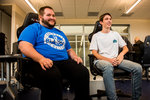
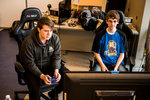
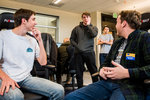
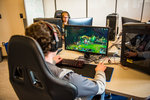
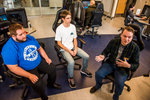
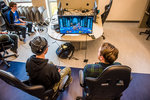
Centralia College is making gamers’ dreams come true with their growing esports team. Since forming in 2018, the team has grown into a roster of 22 players competing in four different games: League of Legends, Overwatch, Rocket League and Smash Bros.
This fall, all roster players will also be offered tuition scholarships.
“We want to find more collegiate events, but of course that requires the other colleges in the Pacific Northwest to catch up, which has been a main focus of our program is getting them the resources they need to get their programs going,” said head coach Jacob Beach.
Beach was hired specifically as a head coach of the esports team, with the intention of building up the program using his nine years of experience in the Esports world. In the past, Beach has spent time in private coaching, where at his peak he had 74 players under contract who would go to tournaments and represent his company, Beach said. While living in southern California, Beach applied to the job posting for Centralia on a whim and was hired on as the esports head coach in September 2018.
“I didn’t really intentionally want to work at a community college,” Beach said. “I felt like it was a little small, but after talking with Shelley and Sam I was like, “Wow, these guys are 100 percent motivated to make this happen.’”
The idea of starting an esports team at the college was first organized by Robert Cox, vice president of Student Services, Shelley Bannish, director of Student Life and Involvement and Sam Small, director of Information Technology. League of Legends player Colton Chilelli has been involved in the program since the beginning and worked with Small to get other players involved.
“We didn’t even have a full team because it was pretty hard to gather interest for League,” Chilelli said. “Also, their rule on being on a full time student sort of drove people away because a lot of people wanted to but they only had 10 credits, so they weren’t quite full time.”
In order for someone to become a player on the team, they have to be a full-time student at the college and maintain a 2.5 or higher GPA. Beach said their goal for the beginning of fall quarter is to have about 40 players on the team’s roster. They are hoping to add a second team for both League of Legends and Overwatch, and they are also looking at adding a Smite team. Each team competes at least once a week, but they are trying to find more collegiate tournaments, Beach said.
“Usually the semifinals for big tournaments, they fly out the teams to compete,” Beach said. “But of course, you have to get top four out of 600 to 700 teams, which is pretty tough to do when we have full-time students with full-time jobs and we can’t practice eight hours a day.”
Currently, each team is required to practice five hours a week in three separate sessions, but players can use the arena anytime to practice more. The program is also beginning to require all players to enroll in a physical education classes at the school or participate in team fitness hours every week. Physical fitness is important in esports because it can help reaction time and learning curves, Beach said. Esports athletes are also not allowed to take the elevator or eat sugary snacks.
Beach’s role as a coach for the team ranges from recruiting new players to helping players improve their skills. Esports coaching does not always consist of trying to show someone how to play, but instead requires changing a player’s mindset and how they approach the game, Beach said. Each game requires Beach to coach differently, but in games like Overwatch, he said he likes to take a hands-on approach.
“(The) majority of what I do coaching-wise isn’t, ‘Work on your aim, work on you reactions,’ it’s changing their mentality, how they view the game differently,” Beach said. “There’s a different mindset for competitive esport athletes versus a casual player, and it’s understanding the game at a deeper level.”
The esports program is also finding ways to get the community more involved. There is an option for challenges open to the community, where anyone can come and challenge the players at the college in League, Rocket League or Overwatch. The challenger pays a small fee to challenge and if they win, they get a prize. Beach said the idea of challenges is to get players more experience and to show the community what the esports team is doing.
This summer, the program is also planning a summer esport boot camp open to all ages and anyone in the community. Each week there will be a different age group; a week for younger kids, a couple weeks for all ages, and then a week dedicated to other college teams. Everything will be provided and at the end of the week there will be a chance for parents to come and spectate.
“It’s harder to get bored of esports because it’s a whole media industry built on pure entertainment,” Beach said. “It’s how they make their money.”
The team recently celebrated a third place finish at the CSL Smash Ultimate Qualifier in Seattle on Feb. 23, where they competed against larger, four-year universities. Beach said they are now working on building players for tournaments that they plan to start hosting at the college.
“We’re starting to really get a feel of where we are as a team, but there is not enough competition right now to really signify anything,” Beach said.
The practice arena is open to the public Monday-Friday from 2-7 p.m., but roster players get priority. Beach will also be in the arena during those times and is available to answers questions or give advice on gameplay. For those interested in joining the esports team, or adding a new game to the program, contact Beach for more information.
Jacob Beach — Esports Coach
360-623-8660
jacob.beach@centralia.edu
www.centralia.edu/students/programs/esports.html